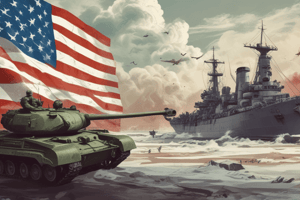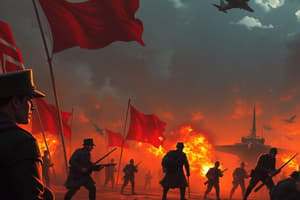Podcast
Questions and Answers
Explain how hyperinflation in Germany during the interwar period contributed to the rise of extremist ideologies like Nazism.
Explain how hyperinflation in Germany during the interwar period contributed to the rise of extremist ideologies like Nazism.
Hyperinflation caused economic instability, wiping out savings and creating widespread discontent. This fostered an environment where extremist ideologies, promising radical solutions and scapegoating, gained traction.
Describe the significance of the Nazi-Soviet Non-Aggression Pact and its impact on the outbreak of World War II.
Describe the significance of the Nazi-Soviet Non-Aggression Pact and its impact on the outbreak of World War II.
The pact ensured that Germany wouldn't have to fight a two-front war, allowing them to invade Poland without Soviet intervention. This invasion triggered declarations of war from France and the UK, starting WWII.
How did the policy of appeasement, adopted by Britain and France towards Hitler, contribute to the escalation of tensions leading to World War II?
How did the policy of appeasement, adopted by Britain and France towards Hitler, contribute to the escalation of tensions leading to World War II?
Appeasement allowed Hitler to expand Germany's territory and military power unchecked. This emboldened him and convinced him that the Allies were unwilling to confront his aggression, leading to further expansion and ultimately war.
What was the 'Final Solution,' and how did the Nuremberg Trials address the atrocities committed during its execution?
What was the 'Final Solution,' and how did the Nuremberg Trials address the atrocities committed during its execution?
Explain the strategic importance of the 'island hopping' campaign in the Pacific Theater during World War II.
Explain the strategic importance of the 'island hopping' campaign in the Pacific Theater during World War II.
Describe the contrasting roles of Franklin D. Roosevelt and Harry Truman in leading the United States during World War II.
Describe the contrasting roles of Franklin D. Roosevelt and Harry Truman in leading the United States during World War II.
What were the main objectives outlined in the Atlantic Charter, and how did it shape the post-World War II world?
What were the main objectives outlined in the Atlantic Charter, and how did it shape the post-World War II world?
Explain how the failures of the League of Nations contributed to the outbreak of World War II.
Explain how the failures of the League of Nations contributed to the outbreak of World War II.
Discuss the effects of the Great Depression on the rise of militarism and aggressive expansion in both Japan and Germany, leading up to WWII.
Discuss the effects of the Great Depression on the rise of militarism and aggressive expansion in both Japan and Germany, leading up to WWII.
In what ways did the Treaty of Versailles impact Germany and contribute to conditions that fostered the rise of Adolf Hitler and the Nazi party?
In what ways did the Treaty of Versailles impact Germany and contribute to conditions that fostered the rise of Adolf Hitler and the Nazi party?
Flashcards
Genocide
Genocide
The deliberate killing of a large number of people from a particular nation or ethnic group with the aim of destroying that nation or group
Hyperinflation
Hyperinflation
An extreme and rapid rise in the price level of an economy.
Anti-Semitism
Anti-Semitism
Hostility to or prejudice against Jewish people.
Appeasement
Appeasement
Signup and view all the flashcards
Blitzkrieg
Blitzkrieg
Signup and view all the flashcards
Nuremberg Laws
Nuremberg Laws
Signup and view all the flashcards
Final Solution
Final Solution
Signup and view all the flashcards
D-Day
D-Day
Signup and view all the flashcards
Island Hopping
Island Hopping
Signup and view all the flashcards
United Nations
United Nations
Signup and view all the flashcards
Study Notes
- World War II study topics for Honors World Studies
Vocabulary
- Genocide is the deliberate killing of a large group of people, especially those of a particular ethnic group or nation.
- Hyperinflation refers to rapid, excessive, and out-of-control general price increases in an economy.
- Anti-Semitism is hostility to or prejudice against Jews.
- The Holocaust was the genocide of European Jews during World War II.
- Appeasement is a diplomatic policy of making political, material, or territorial concessions to an aggressive power in order to avoid conflict.
- The Non-Aggression Pact was a treaty between two or more states agreeing to avoid war or armed conflict between them and resolve their disputes through peaceful negotiations.
- Blitzkrieg is a military tactic calculated to create psychological shock and resultant disorganization in enemy forces through the employment of surprise, speed, and superiority in matériel.
- Nuremberg Laws were antisemitic laws enacted in Nazi Germany.
- The Final Solution was a Nazi plan for the extermination of the Jews during World War II.
- D-Day, also known as the Normandy landings, were the invasion of Normandy by the Allied forces.
- Island Hopping was a military strategy employed by the Allies in the Pacific War against Japan and the Axis powers during World War II.
- The United Nations is an intergovernmental organization aiming to maintain international peace and security, develop friendly relations among nations, achieve international cooperation, and be a centre for harmonizing the actions of nations.
- Nuremberg Trials were a series of military tribunals held after World War II by the Allied forces.
Important Figures
- Adolf Hitler was the dictator of Nazi Germany.
- Benito Mussolini was the leader of the National Fascist Party in Italy.
- Hideki Tojo was a general of the Imperial Japanese Army and Prime Minister of Japan during World War II.
- Emperor Hirohito was the emperor of Japan during World War II.
- Franklin Roosevelt was the President of the United States during World War II.
- Harry Truman was the President of the United States toward the end of World War II.
- Neville Chamberlain was the Prime Minister of the United Kingdom before World War II.
- Winston Churchill was the Prime Minister of the United Kingdom during World War II.
- Joseph Stalin was the dictator of the Soviet Union during World War II.
Key Concepts
- The effect of the Great Depression on World War II.
- The impact of the Treaty of Versailles on World War II.
- Italian, German, and Japanese aggression to start World War II.
- Failures of the League of Nations
- Impact of World War II on colonial empires
- Nazi-Soviet Non-Aggression Pact
- The Battle of Britain
- French Resistance
- Nuremberg Laws
- Final Solution
- Nuremberg Trials
- Destroyers for Bases and Lend-Lease Act (US & UK)
- The Atlantic Charter and United Nations
- Attack on Pearl Harbor
- North Africa Campaign
- D-Day
- Island Hopping Campaign
- Conferences such as Yalta, Tehran, and Potsdam
- The Manhattan Project & the use of the Atomic Bomb
Studying That Suits You
Use AI to generate personalized quizzes and flashcards to suit your learning preferences.




